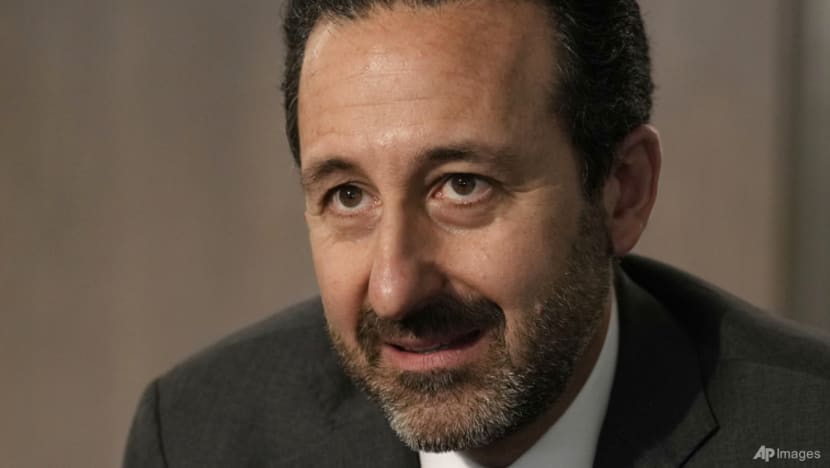More concrete steps needed for ambitious climate ‘loss and damage’ fund to help vulnerable nations: ICRC head
Climate financing has been a key sticking point, with rich countries not delivering on promises to support developing nations which are worst affected by the climate crisis.


This audio is generated by an AI tool.
DUBAI: More concrete steps need to be taken to support an ambitious new “loss and damage” deal for countries affected by climate change, said International Committee of the Red Cross (ICRC) Director-General Robert Mardini.
“There’s definitely progress. But now, concrete action needs to take place on the ground,” he told CNA on Saturday (Dec 2) on the sidelines of COP28, the United Nations Climate Change Conference in Dubai.
“There should be an acceleration of all the steps that will ensure that concrete climate action and finance will reach those people,” he added.
“Because the issue is urgent from a humanitarian standpoint and cannot wait many years to figure out what are the mechanisms and what are the right disbursement tools. So time is of the essence and it's urgent.”
CLIMATE FINANCING A MAJOR STICKING POINT
On Thursday, the first day of the COP28 climate talks, a "loss and damage" fund to compensate vulnerable countries suffering the irreversible impacts of climate change was formalised, drawing praise from delegates and hundreds of millions of dollars in pledges.
The agreement is “certainly a positive step”, said Mr Mardini.
“ICRC colleagues across the world see first-hand the immense suffering of communities and people affected by the combined effects of conflict and climate change,” he said.
“They are much more visible, they are much more felt by communities, and climate action and climate finance should reach those very difficult places.”
Climate financing has been a key sticking point, with rich countries not delivering on their promises to support developing nations that are worst affected by the climate crisis.
Helping vulnerable countries deal with the impact of extreme weather and global warming has been a focus at the ongoing climate summit.
“That's the whole purpose of having COP28 here. The grievances are very important, understandably so when we see the impact of climate change in developing countries and communities day in and day out,” said Mr Mardini.
“So of course, much more needs to be done, much faster and those cries are legitimate. And I think the world and the international community should address this issue head on.”
MUCH MORE IS NEEDED TO HELP VULNERABLE NATIONS
While some activists and experts are sceptical that the forum will be able to change the situation, he believes that there is still hope.
“This is the only forum at the end of the day where decision makers can meet in the same place and over the same issues, and climate change is the burning issue of our planet,” he added.
“Concrete action needs to happen in order to ensure that the situation will not further deteriorate.
“We need to help communities that are already being the victims of climate shocks (and) adapt to this extremely challenging situation.”
Observers have pointed out that climate change is likely to worsen conflicts in war-torn states.
While climate shocks do not cause conflicts, they exacerbate existing tensions and other underlying fragilities such as hunger.
“It's a vicious cycle,” said Mr Mardini. “It increases the level of armed violence that in turn puts people in harm's way.”
‘NIGHTMARISH SITUATION’ IN GAZA
In the interview, Mr Mardini also touched on the growing humanitarian crisis in Gaza.
Aid agencies in the war-torn territory are picking up efforts to help civilians there, after the end of a week-long truce between Israel and Hamas.
The truce was absolutely critical in giving civilians a respite, said Mr Mardini, adding the brief pause in fighting allowed aid to be delivered to them.
“The humanitarian situation was nothing short of catastrophic. Entire neighbourhoods were levelled, more than a million people displaced. Scores of people were killed or wounded.”
But as the fighting continues, “it's back to a nightmarish situation where nowhere safe exists in the Gaza Strip for people to flee to, (and) families are in harm's way”, he noted, adding that hospitals cannot keep up with the load of casualties.
“There are challenges to get food (and) medicines... Humanitarian aid will be likely to trickle down rather than flow in, and this will be a massive challenge in humanitarian terms for the civilian population.”
FAMILY REUNIFICATION IS THE KEY HUMANITARIAN OUTCOME: ICRC
The ICRC has been involved in helping to transport some of the freed Hamas hostages to safety.
“This is really our role as a neutral intermediary. The ICRC as a guardian of international humanitarian law has established, for many years, dialogue with the Israeli side and Hamas to ensure that they respect their obligations under (the international humanitarian law),” said Mr Mardini.
Family reunification is the key humanitarian outcome, said Mr Mardini, adding that transferring the hostages is a “highly sensitive operation”.
“It is simple because it's basically transporting hostages and detainees from one point to the other, following a negotiated agreement by the parties. But at the same time, it's very complex because every single detail is being negotiated and the situation is fluid,” he said.
The ICRC has called for better conditions for Israelis and Palestinians to live “a dignified life”.
“This will start with first and foremost parties to the conflict respecting their obligations under the Geneva Conventions,” said Mr Mardini, referring to international treaties that regulate the conduct of armed conflict and protect people who are not taking part in hostilities.
“They need to take every precaution to protect civilians. They need to ensure and to facilitate humanitarian deliveries and support the work of humanitarian actors, with or without ceasefire, with or without tools, (and) with or without a humanitarian corridor.”
These are the obligations of the parties involved in a conflict, he added.
“Humanitarians will always try to move the limits of the possible and push them further, but they can only do so much when cities are turning into rubble and fighting is raging.”



















